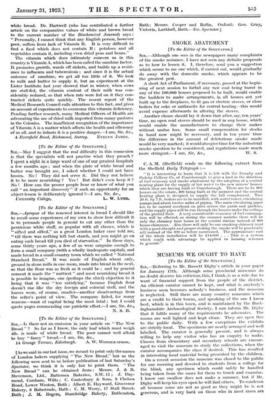SMOKE ABATEMENT
[To the Editor of the SPECTATOR.] SIR,—Although one sees in the newspapers many complaints of the smoke nuisance, I have not seen any definite proposals as to how to lessen it. I, therefore, send you a suggestion which seems to me one which, if carried out, would gradually
do away with the domestic smoke, which appears to be' the greatest pest.
A short Act of Parliament, if necessary, passed at the begin- ning of next session to forbid any raw coal being burnt in any of the 100,000 houses proposed to be built, would enable the builders to make arrangements, in all houses not yet built up to the fireplaces, to fit gas or electric stoves, or close boilers for coke or anthracite for central heating—this would avoid expense afterwards in altering the stoves.
Another clause should lay it down that after, say, ten years' time, no open coal stoves should be used in any house, which would enable the manufacturers to change their makes without undue loss. Some small compensation for stocks in hand now might be necessary, and in ten years' time the difference in the amount of deleterious smoke made would be very marked; it would also give time for the industrial smoke question to be considered, and regulations made much more stringent.—I am, Sir, &c., W. S.
C. A. M. (Sheffield) sends us the following extract from the Sheffield Daily Telegraph :—
"It is interesting to learn that it is left with the Denby and Cadeby Colliery Co. of Conisborough to give a lead in the direction of fuel economy and smoke abatement by the adoption of a central heating plant for the supply of hot water to the new miners' houses which they are haying built at Conisborotigh. There are to be 800 houses on the estate, 400 being built at the moment and the central heating plant is designed to supply the full complement. Two 30 ft. by 7 ft. boilers are to be installed, with water tower, circulating pumps and about twelve miles of piping. The main circulating pipes are to be carried overhead on piles across the yards and gardens, and the supply pipes will be run through the houses under the ceilings of-the ground floor. A very considerable economy of fuel consump- tion will be effected, as during the summer months there will be only, the chimney heat losses at the central station instead of 800 house chimneys. Also there will only be one smoking chimney (and with a good draught and proper stoking the smoke will be practically nil) instead of the 800 as before mentioned. The approximate cost of the whole installation will be £14,000 . . . This is a system which could. with advantage be applied to housing schemes in general."














































 Previous page
Previous page